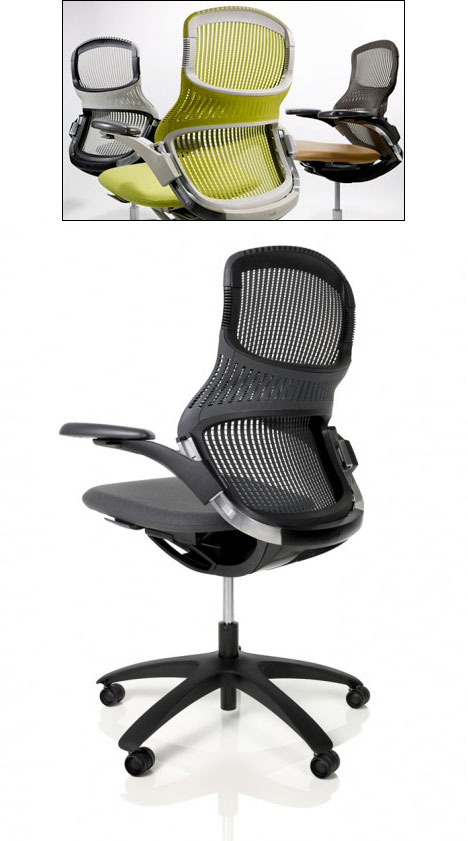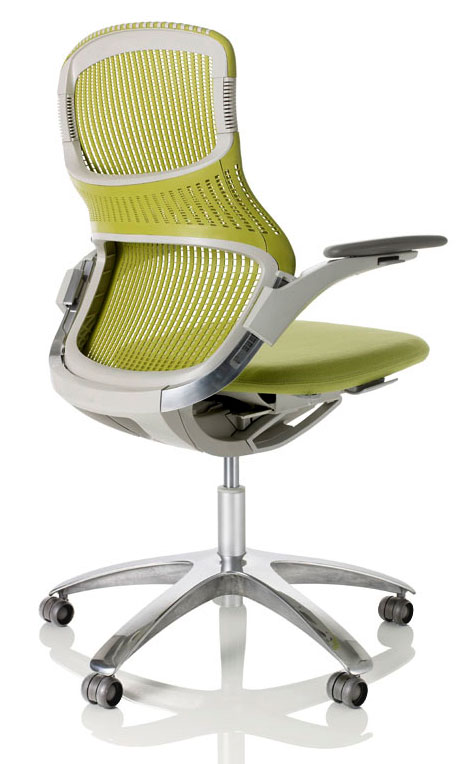"Living With" product review: Knoll's Generation chair
Remember the hot girl (or guy) in your high school? If they had a sibling, that sibling was almost never hot, and didn't try to be; they realized the incumbent had the hot thing locked down, so they went in a different direction. Siblings of the hot were really witty, and told great stories, and knew where to get booze for the party, and in general were more fun to hang around with.
That's basically Knoll's Generation chair. With competition like the Aeron and the Embody, the Generation strives to do the things those chairs cannot, and succeeds at them. Whether or not those things are things you desire in a chair depends largely on how you sit, or don't sit.

We spent every day for just over a month testing out the Generation. Hit the jump for our findings.Overview:
The first thing you notice about the Generation is its matrix-like backrest, made from high-performance elastomer. It bends and flexes in varying degrees according to the location and size of the carefully-placed perforations. There is a pleasing but not excessive amount of give, well-calculated enough that it makes you feel you're sitting in something expensive.


The second thing you notice is the armrest supports, or rather their absence; instead of coming straight down from the armrests, they wrap around to the back of the chair, meaning you can sit in this chair completely sideways, leaning against the backrest with your side, and there's plenty of room for your legs under the armrest. Despite this added feature, the armrests still provide good support and are easily height-adjustable. It's easy to get them into just the right position with a minimum of fiddling.

The seat bottom is predominantly flat and pan-shaped and accommodates this sideways posture; the entire periphery of the seat bottom actually flexes downwards when pressure is applied to it, curling it into an impromptu and supportive lip.

But the great magic trick of this chair is the top of the seatback. The matrix has been designed in such a way that it bends back upon itself when pressure is applied to it, allowing for extreme lean-back stretching, an armrest when you turn to speak to someone behind or to the side of you, and a comfortable headrest when you slouch down in the chair. I cannot say enough good things about this feature, and I often activated it for its own sake. It actually makes the chair fun to sit in, though fun isn't something we often equate with office furniture.

I should point out that the flexibility in this chair does not come from flimsiness; the chair can look deceptively flimsy in some of the smaller press photos, and when seeing and sitting in the real deal I was surprised to find it sturdy and well-built. The flexibility, in short, comes from careful and thoughtful engineering, not thin plastic.
Actual Usage
The personal, long-term appeal of the Generation will depend on how you sit. I work from home and spend much of my days and nights at the desk-chair-laptop combo, doing work during daylight hours and lounging and movie watching in the same location at night. During work, my fingers always need to be on the keyboard and mouse--I'll rarely, say, read a PDF for more than 30 seconds and not need to be typing something from it--so during work hours I mostly sit in a normal, frontward facing position, in various states of recline, and do not have the opportunity to make use of the Generation's 360 seating possibilities. It's not easy to type while sitting sideways on it, for instance; that feature is probably intended more for when you're conversing with co-workers, which I do not have. The Generation chair is designed for offices that have more of a social-interactive nature to them.
For me as a solitary worker, I found the Generation a Godsend mostly at night, or during leisure time when I had no need to type, and I'd happily sit in it sideways--both leaning sideways against the backrest, or leaning slightly back, throwing my legs over one armrest and adjusting the other to support my lower back, although the edge of it cutting into your back doesn't enable this latter position for as long as the former position. I also discovered you can turn the chair around completely, Rog-from-What's-Happening-style, and the sensation of having the front of your body supported by this mesh matrix is both unusual and comfortable in a very novel way. (In this position all I'd need is a masseuse behind me and I'd be in heaven.) This is an absolutely fantastic chair to watch movies in.
Problems and Criticisms
I only had two minor gripes with the chair. The first was with the material chosen for the backrest; it has a certain amount of "tack," or friction, to it, and often when sitting in the chair and leaning back or shifting slightly, the backrest surface would pull my shirt up in the region of the lower back. If I was wearing a shirt that was tucked in, I'd need to readjust it every time I stood.
The second is the pan-shaped seat bottom, filled with what feels like dense foam. Having been spoiled by Aerons, Embodys and the like, I was not used to the "dead spots" you feel when sitting in the same position on a firm foam surface for long hours. It requires you to move to get the circulation going in that particular spot, rather like in an airplane seat. But I feel compelled to point out that this is no different than any other chair with a foam seat, and I understand, from a design perspective, that the flat shape is required to enable sideways seating (try sitting sideways on the Aeron, for instance, and the rim of the seat support will bite into your lower thigh). Whether or not you consider the trade-off worth it will depend largely on how much you will shift in the chair and use its manifold positional possibilities.
Conclusion
The sturdy, flexible-in-multiple-ways Generation is not like any other chair I've sat in, as it truly does let you "Sit how you want," which is the chair's catch-phrase. If you work in an open office and have the opportunity or need to frequently interact with those around you, this chair will probably suit you well, and fidgety change junkies will feel like the Generation has dropped out of the sky. Constantly forward-facing, solitary workers will want to give it an extended test-sit first.
Video of the Design Process
The Generation was designed in collaboration with New-Zealand-based Formway Design, seen explaining the design process in the video below.
-
oFavorite This
-
QComment
K
{Welcome
Create a Core77 Account
Already have an account? Sign In
By creating a Core77 account you confirm that you accept the Terms of Use
K
Reset Password
Please enter your email and we will send an email to reset your password.

